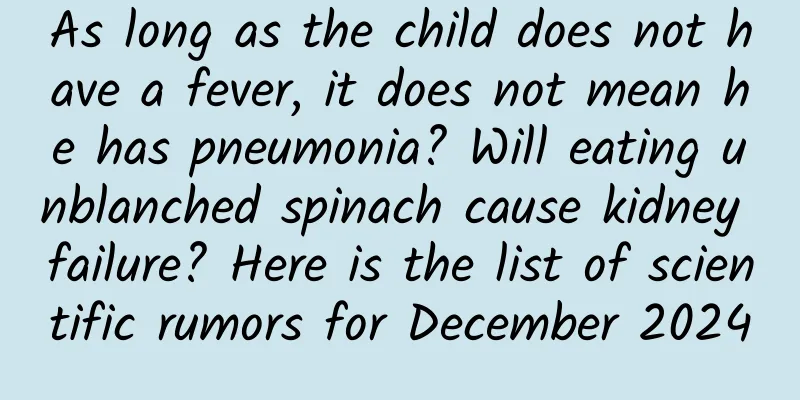As long as the child does not have a fever, it does not mean he has pneumonia? Will eating unblanched spinach cause kidney failure? Here is the list of scientific rumors for December 2024

|
1. As long as the child does not have a fever, does it mean that he does not have pneumonia? Rumor: In autumn and winter, children are prone to upper respiratory tract infections. If the child does not have a fever, it means the condition is not serious and has not turned into pneumonia. The truth: This statement is too absolute. Fever is indeed a common symptom of pneumonia for children, but we cannot assume that a child does not have pneumonia just because he or she does not have a fever. For younger children, the level of body temperature is not necessarily directly related to whether or not they have pneumonia. The combined effects of factors such as the type of pathogen, the child's physical condition, and the type of medication used may result in a child having only a low-grade fever or no fever even though he or she has pneumonia. Therefore, on the one hand, we need to pay attention to the child's body temperature, and on the other hand, we also need to pay attention to whether the child has any abnormal breathing, such as counting the number of breaths, whether there are symptoms such as "three concave signs" (the suprasternal fossa, supraclavicular fossa and intercostal space concave inward when inhaling), and whether there are problems such as mental depression and loss of appetite at the same time. If you suspect that your child may have pneumonia, it is recommended to take the child to the hospital for medical treatment in time. Source: People's Daily Health Client 2. Can I take vitamin tablets at will without any side effects? Rumor: Vitamin tablets can be eaten as casually as candies. They can replenish nutrients regardless of whether you are lacking them or not, and can also prevent various diseases. There is no harm in eating more. The truth: This statement is not correct. Vitamins are divided into two types: water-soluble and fat-soluble, and they cannot be generalized. Water-soluble vitamins (such as vitamin B group and vitamin C) are easily excreted through urine in the body, so they are relatively safer, but excessive intake at one time may still increase the burden on the kidneys, irritate the gastrointestinal tract, and cause skin allergies. Fat-soluble vitamins (such as vitamin A) will accumulate in the body's adipose tissue or liver. Excessive intake may make it impossible to completely excrete, and long-term accumulation may cause health problems. Therefore, the use of vitamin tablets should follow the doctor's advice and should not be taken in large doses for a long time. Source: Tencent 3. Will eating unblanched spinach cause kidney failure? Rumor: The oxalic acid in spinach can cause serious health problems. There was even a case of a 61-year-old man suffering kidney failure after eating unblanched spinach. The truth: This statement exaggerates the risk, and healthy people don't have to worry about eating spinach. Spinach is rich in oxalic acid, and excessive intake accompanied by insufficient drinking water or insufficient calcium intake may increase the risk of calcium oxalate stones (such as kidney stones), but this process is relatively slow and is unlikely to cause kidney failure immediately. In the case of "61-year-old man suffered renal failure after eating unblanched spinach", the man's renal failure was mainly due to his chronic kidney disease, not simply due to eating unblanched spinach. It is not difficult to reduce the oxalic acid content. It is easily soluble in water, and blanching can remove most of the oxalic acid. Therefore, it is recommended to do this step before cooking spinach, especially for people with kidney disease. In general, eating unblanched spinach will not directly cause kidney failure in healthy people, but patients with existing kidney disease should be cautious. When faced with similar information, the public should fully understand the background of the facts to avoid being misled. Source: Science Refutes Rumors 4. Is standing desk healthier than sitting desk? Myth: Sitting for long periods of time at a desk is harmful to your health, but standing up can offset the damage. The truth: This statement is too absolute and misses the point. Although standing at work can slightly increase energy consumption and improve certain metabolic indicators such as blood pressure, insulin sensitivity and triglyceride levels, these improvements are not enough to significantly reduce the risk of cardiovascular disease. Studies have shown that whether sitting or standing for a long time, maintaining the same posture for a long time will increase the risk of postural circulatory diseases, such as varicose veins and chronic venous insufficiency. The key to a healthy workplace is to alternate between sitting and standing, change posture regularly, and incorporate simple activities such as stretching and short walks to mitigate the negative effects of a single posture. Using an adjustable-height desk, ensuring correct posture when standing, and wearing comfortable shoes are all effective strategies for maintaining a healthy workplace. To sum up, it is not advisable to simply rely on standing desks to offset the harm of sitting for long periods of time. Reasonable adjustment of working methods and environment is the long-term solution. Source: Science Refutes Rumors 5. Elderly people should drink more soup because all the nutrients are in the soup ? Rumor: The essence of the ingredients is in the soup. If the elderly drink more soup, their nutrition will be guaranteed, which is more effective than eating meat or vegetables. The truth: This statement is wrong. Although the elderly may tend to drink soup, especially meat soup, chicken soup, duck soup, pork rib soup and seafood soup, due to their atrophy of taste buds and decreased appetite, because the amino acids and a small amount of fatty acids in these soups can bring delicious taste and promote appetite. But in fact, more than 90% of the protein is in the ingredients. It is not enough to supplement protein and calcium by drinking soup alone, which may lead to malnutrition in the elderly. Therefore, it is recommended that the elderly eat meat (vegetables) and other ingredients while drinking soup to meet their protein needs. In addition, the diet of the elderly should focus on balanced nutrition, including sufficient intake of high-quality protein, calcium, vitamins and minerals, and should not rely solely on drinking soup to obtain nutrition. Source: Tencent 6. Should I drink less water as I get older? Rumor: The kidney function of the elderly decreases, and drinking too much water will increase the burden on the body and even cause water poisoning, so the elderly should reduce their water intake. The truth: This view is not correct. In fact, the elderly need to pay more attention to proper water replenishment. As they age, the elderly's perception of water shortage decreases, and they are prone to dehydration without realizing it. Insufficient water intake can cause many harms to the elderly, including worsening skin, increased risk of urinary system diseases, worsening constipation, and reduced cognitive ability. For the elderly who do not have special conditions such as severe renal insufficiency, liver disease or congestive heart failure, it is very important to maintain adequate water intake. Drinking water in moderation will not only not harm kidney health or increase the burden on the body, but will help maintain good health. The "Dietary Guidelines for Chinese Residents" recommends that the elderly drink 1500 to 1700 ml of water per day, with boiled water being the first choice, and light tea or lemonade can also be chosen. Source: Science Refutes Rumors About the Science Rumors List Released by the China Association for Science and Technology, the list is reviewed by experts every month. Based on criteria such as timeliness and harmfulness, hot rumors are selected for special interpretation and pushed across the entire network. Jointly published: Scientific rumor-busting platform, China Internet Joint Rumor-busting Platform, "Study to Strengthen the Country" learning platform Supported platforms: Weibo rumor refutation, Toutiao rumor refutation, Tencent Jiuzhen, NetEase Health, Toutiao Health, Baidu Knows, Douyin Scientific rumor debunking: Sponsored by the China Association for Science and Technology, the National Health Commission, the Ministry of Emergency Management, the State Administration for Market Regulation and other ministries and commissions, guided by the Central Cyberspace Affairs Commission, and jointly created by national societies, authoritative media, social organizations and scientific and technological workers, it aims to effectively improve the dissemination, guidance and influence of rumor debunking information, so that rumors can stop at the wise and let science outrun rumors. List of review experts (In order of the number of strokes of surname) Song Shuang, Associate Researcher, Institute of Nutrition and Health, Chinese Center for Disease Control and Prevention Song Lidan, Senior Engineer, China Textile Construction Planning Institute Chen Rui , Associate Professor, Institute of Communication Psychology, School of Journalism, Communication University of China Jia Changkai, deputy chief physician, Xiamen Eye Center affiliated to Xiamen University Tang Qin, Director of the Science Popularization Department of the Chinese Medical Association, National Health Science Popularization Expert |
>>: Cerebral venous sinus thrombosis: With effective treatment, there is hope for a new life
Recommend
How to calculate light menstrual flow
Menstruation occurs when a woman's body matur...
How to recover from pelvic relaxation
Pelvic relaxation is often related to childbirth....
The best time to replenish blood and qi after childbirth
We Chinese have always attached great importance ...
When will Jin Jun Mei be available on the market? Where is Jin Jun Mei produced?
Jin Jun Mei is small and compact. Its color is go...
What to do if you have nodules in your breast
In real life, breast disease has always been the ...
Why do women have no water?
Generally speaking, during sex, a woman's pri...
Does rib pain during pregnancy mean the baby is big?
During pregnancy, women's hormones and uterus...
Diabetes caused by diet, can you eat less staple food? 4 dietary methods to control blood sugar and prevent rebound
Currently, the incidence of diabetes in China is ...
Caesarean section without anesthesia
The process of pregnancy itself is very hard, so ...
Counterpoint: 2023Q2 Global Smartphone Market Report
The Market Monitor report for the second quarter ...
Young fathers: It is best to sow in winter
Author: Han Fei (Center for Excellence in Molecul...
Ovarian massage and maintenance, do you understand these methods?
The health of the ovaries is extremely important ...
Characteristics of girls with high IQ
Everyone hopes that their IQ is relatively high, ...
What is the difference between a follicle and an egg?
Ever since we took biology class, we have known t...
What is the rank of the Great Lord Muchen's mother? The true identity of Muchen's mother is revealed
In recent years, TV series adapted from novels ha...









